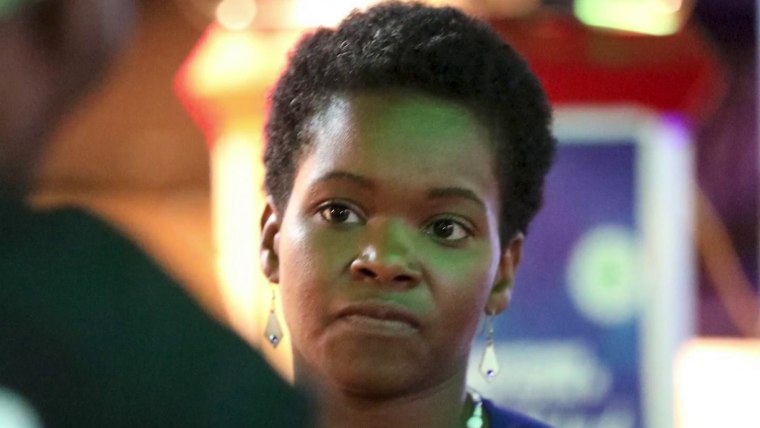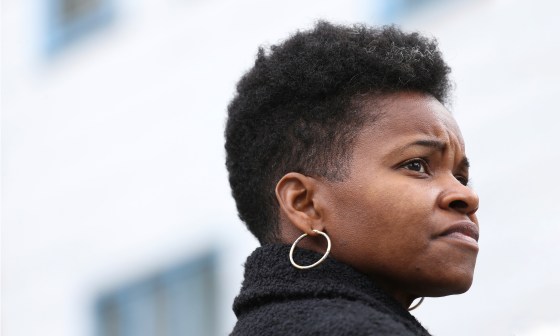Back in June, India Walton’s political rise appeared to resemble the shocking emergence of Rep. Alexandria Ocasio-Cortez. A young, little-known socialist activist with no experience in office, Walton rode the energy of a successful grassroots campaign to topple a seasoned establishment Democratic incumbent in a Democratic primary for mayor of Buffalo, New York. Given that Buffalo hasn’t had a Republican since 1965, it appeared that Walton was poised to become the first socialist mayor of a major American city in over half a century.
If association with "defund the police" renders unabashedly left-wing candidates in liberal cities vulnerable — it's worth reflecting on alternative framings.
But then something unexpected happened. Her opponent — Byron Brown, a moderate who has been in office for four terms and faces questions of corruption over his ties to an FBI probe into city development contracts — decided to run a write-in campaign. That campaign has focused on fear-mongering: He has no policy platform on his website, but he has hammered Walton as a political extremist and sought to mobilize the city’s small Republican population in his bid to best her. Polling released this week suggests his strategy may be working.
Brown’s greatest weapon has been focusing on Walton’s positions on policing. Walton has been an enthusiastic participant in Black Lives Matter protests in Buffalo and gained prominence as a leader in the activist scene during the cultural upheavals after the police murder of George Floyd. As she settled on her outsider bid for mayor, she initially fully embraced the “defund the police” slogan, but has since distanced herself from the term. That hasn’t slowed down Brown’s attacks on her over her police positions, in which he’s deemed her an “apologist for criminals” and spread false information about her police budget plans.
I spoke briefly with Walton over the phone this week, and what I found was a very interesting position on police reform. She has a thorough and impressive public safety policy platform that’s clearly underpinned by the ideas of the "defund the police" movement, but she avoids the “defund” term — not because she disagrees with it, but because she thinks it doesn’t translate to a non-activist audience.

“You cannot encapsulate [her proposals for reallocating police budgets] in one word and expect people in the general electorate to understand what that means,” she said.
Walton’s experience is an important one for left-wing candidates and politicians to keep in mind as they debate how to tackle systemic police reform: If association with "defund the police" renders unabashedly left-wing candidates in liberal cities vulnerable — it's worth reflecting on alternative framings.
Walton’s emergence as a serious candidate for mayor of New York’s second-biggest city is remarkable, both given her personal biography and her status as a political outsider. She grew up poor in the city’s impoverished East Side and had her first child at the age of 14. She had to quit high school to take care of her children, but she later earned her GED certificate and became a nurse.
Walton has long been involved in community organizing and left-wing activism. She connected with members of the Democratic Socialists of America after Sen. Bernie Sanders’ first presidential run, and she served as the founding executive director of the Fruit Belt Community Land Trust, a nonprofit organization that helps keep housing affordable for longtime residents and partners with other organizations to build affordable housing in the city. She’s also been on the front lines of racial justice protests, which served as a backdrop last year for her decision to take a shot at the mayor’s office.
That activism has inspired and shaped her progressive policy platform — and in some ways complicated its political viability.
Walton’s policy proposals for dealing with Buffalo’s public safety challenges would involve reducing police budgets and reallocating those funds for, among other things, violence intervention and prevention specialists who embed in communities and mediate conflicts and a nonviolent first responder corps made up of social workers and other trained mental health professionals. Her proposals also highlight the need for improving infrastructure, attention and care for students in schools and affordable housing. The point, she said, is to find ways of “improving accountability and transparency in the police department while addressing the root causes of violent crimes — and building community and alternatives to calling 911.”
I told Walton her public safety ideas looked like a "defund the police" platform without calling itself a "defund the police" platform and asked what her relationship with the slogan and movement was. She responded with an analogy worth quoting in full:
I had a doctor's appointment the other day, and I told one of my [campaign] staff members that I have to be NPO for eight hours before I went. And he said, "NP- what?" And I said, "NPO — I can't have anything to eat or drink."
He doesn't know what the heck NPO means, but I'm a nurse, so I do: It means nothing by mouth.
So you and I saying "defund" as a term know that means we're not necessarily getting rid of police altogether but that we're making the best use of the police budget and resources in ways that get to the root cause of violence. But you cannot encapsulate that in one word and expect people in the general electorate to understand what that means.
What's interesting about Walton's point is how it marks her evolution from an activist who said she would "absolutely" campaign on a defund the platform and openly used the term to someone who believes the term isn't an effective way to communicate.
In an interview with the Buffalo News' editorial board in June — during which she insisted “defunding” the police is “not a thing” — she said, "I think that we get caught up in negative terms and it's not an effective way to communicate with people."
"Most folks appreciate hearing the positives. We're not defunding; we are reinvesting in communities, we are putting money in places that we know naturally reduce crime," like jobs and affordable housing,” she added.
Walton’s pivot happens to overlaps with a point I’ve made, as well. "Defund the police" has commendable goals, but the slogan omits half of what the paradigm is about — not just divesting from conventional policing, but investing in alternatives meant to increase safety for all members of a community. And "defund the police" not only fails to do justice to its full range of ideas, it’s also uniquely vulnerable to attacks and fear-mongering from the right.
Walton’s attempt to walk a careful line on "defund" speaks to the dilemmas that encumber anyone at the juncture of street-level activism and electoral politicking.
The fact that Walton is sticking by her guns on a policy level but has moved away from "defund" rhetorically suggests she’s noticed how the term rendered her exposed to attacks from Brown — despite the fact that she won the Democratic primary. Brown has used her association with the movement in debates and negative ads, and powerful police unions have used it to paint Walton as a radical. Pollsters say Brown’s 17-point lead over Walton in a recent poll may be attributable in part to Brown’s negative messaging — much of which has focused on her positions on policing.
Walton’s attempt to walk a careful line on "defund" speaks to the dilemmas that encumber anyone at the juncture of street-level activism and electoral politicking, and it illustrates the difficulty of confronting how slogans that excite in one arena can alienate in others.
"Sometimes we get caught up in this progressive purity; we love to dismiss people who don't have the same understanding of the issues that we have," Walton said. "Sometimes we have to move at the speed of trust rather than expecting someone to come fully prepared and as knowledgeable as the rest of us."
Polling trends indicate policy descriptions of funding alternatives to conventional policing are far more popular than talk of defunding the police.
There aren’t easy answers here. Some "defund the police" activists might argue that emphasizing only investment while sidelining or omitting discussion of divestment from police forces is to deny that the movement sees the reduction of police contact in communities as an inherent social good. And there are already scenarios where police budgets in a municipality remain constant while additional services focused on mental health services are funded atop those budgets — a more incremental approach than some "defund" activists might like.
Another challenge is that if a politician embraces "defund the police" policies while calling them something else, there is still little to protect them from being slammed with that label. In fact, that seems to be precisely what’s happened with Walton after her pivot. Leftist police reform advocates will probably always face accusations of being agents of anarchy and advocates for eliminating the police, regardless of what they actually believe.
I find Walton’s commitment to systemic police reform — as well as much of the rest of her policy platform — admirable. I’ll be watching how her attempt to navigate the tricky business of selling it to the public pans out. (It will be far from the only factor that decides her fate on Election Day, but it'll not be a small one.) I hope others will, too.

